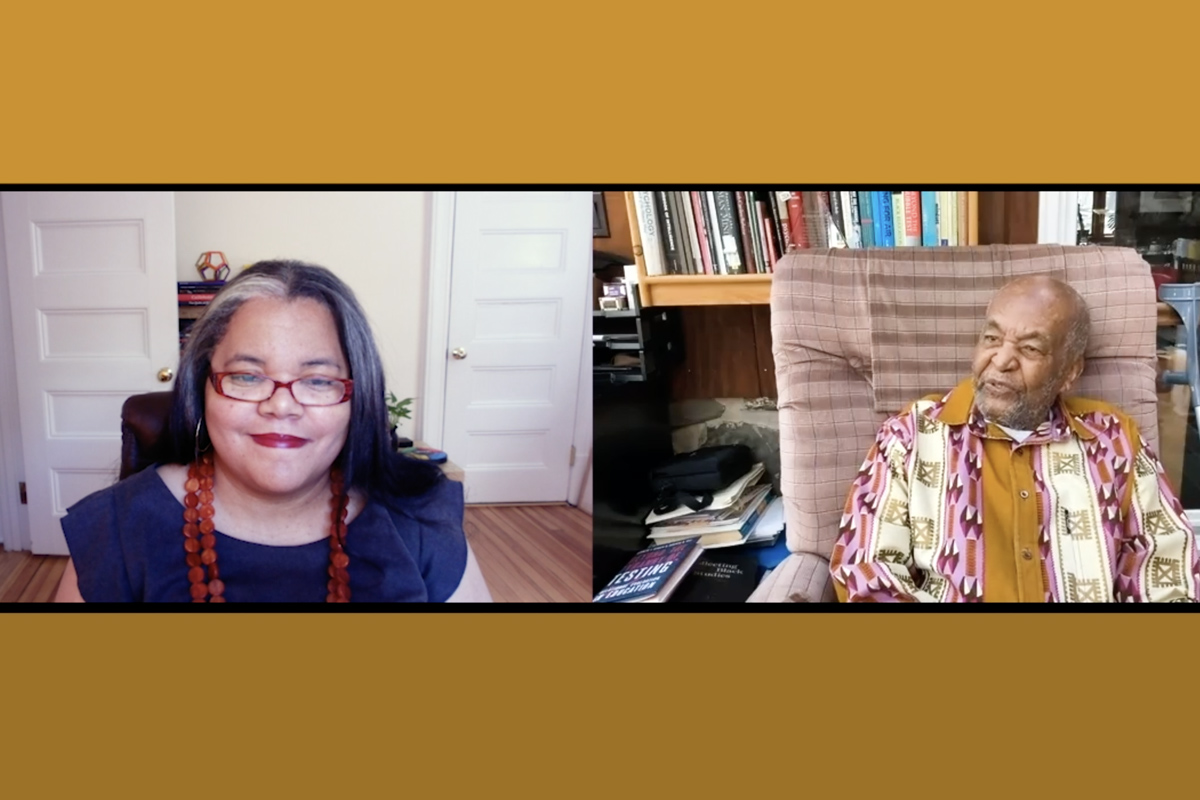“I have always experienced education as having primarily to do with relationships between people.”
As the legendary psychologist Edmund W. Gordon went on to explain in a recently videotaped interview that was shown this past Wednesday at the opening of an international conference to celebrate his upcoming 100th birthday, when teachers truly know their students, they know — in ways that today’s standardized assessments fail to recognize, particularly in children of color and from non-Western cultures — the kind of knowledge and experience that those students bring to the classroom and what their level of understanding might be at any given moment. Recalling a teacher from his own childhood, Gordon, Teachers College’s Richard March Hoe Professor Emeritus of Psychology & Education, argued that educators who are deeply connected to their students are more apt to recognize the potential for what students can accomplish in the future.
Opening Ceremony and Keynote Speech Linda Darling-Hammond: “The Quest for Educative Assessments”
Featuring: Thomas Bailey, TC President; Stephanie Rowley, TC Provost; Linda Darling-Hammond, Learning Policy Institute and Stanford University; and Michelle Knight-Manuel, Teachers College.
Against the backdrop of inequities that have widened during the COVID pandemic, and with standardized testing resuming after a year-long hiatus, it was that vision of assessment — and education in general — that brought together the conference’s star-studded cast of educators, policymakers and researchers. Over two days, they not only paid tribute to a giant who remains an active force in education but also sounded the call for profound change in American schooling.
[In this story, we report on highlights from the first day of the Edmund W. Gordon Centennial Conference, “Learning and Thriving Across the Lifespan: Building on the E. W. Gordon Legacy on Affirmative Development and Equitable Education for Every Learner.” Read a full report on day two the conference, including closing remarks by Edmund Gordon.]
In her keynote address, former TC faculty member Linda Darling-Hammond cited Gordon’s insistence “that serious scholarship, intellectual rigor, and social responsibility are inseparable.”
For Hammond — Director of the Learning Policy Institute, past director of the education transition teams for incoming presidents Biden and Obama, and the Charles E. Ducommun Professor of Education Emeritus at the Stanford Graduate School of Education — those connections underscore why “our efforts to both comprehend and change an educational system, which routinely places many students at risk, are not only legitimate, but necessary.”
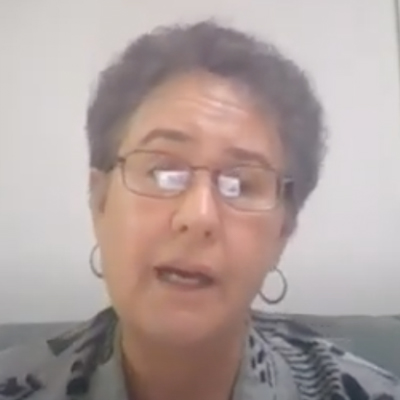
In the next few years, I think we will see progress toward Ed's goal of educators building a system of education that empowers every child.
In particular, Darling-Hammond said, “assessment has so often been used to create and reinforce inequality and oppression.” She challenged her listeners to reconceptualize testing “so that it is educative and supportive of learning, rather than reductive, punitive, and a barrier to educational opportunity.”
What would that look like?
Darling-Hammond pointed to Gordon’s articulation of “educative assessment” – literally, “assessment that educates” rather than that which is used to discriminate among learners for purposes of predicting their success or failure. Educative assessment includes the use of gaming as a basis for simulations and other “stealth assessments” in which students engage in problem solving and critical thinking, all the while unaware that they are being assessed. Gordon also has called for the use of writing portfolios that could be integrated into instruction for individual students, Darling-Hammond said.
Session I: Towards Affirmative Development of Intellective Competence & Agency in Every Human
Featuring: Christopher Emdin, Teachers College; C. Malik Boykin, Brown University; Ana Mari Cauce of University of Washington; Freeman Hrabowski III, University of Maryland, Baltimore County; Robert J. Sternberg, Cornell University; Ernest Washington, University of Massachusetts, Amherst; Herve Varenne, Teachers College.
“Students could develop their pieces of writing that can be scored reliably using rubrics such that teachers will see what students are learning” and build on this foundation “to reach the next level of proficiency and competency,” she said, adding that such portfolios were used in Kentucky and Vermont “before the days of No Child Left Behind.” In her own work with the Biden administration’s education transition team, Darling-Hammond said, she met with numerous state school leaders, foundation executives, and education innovators who are seeking “to develop curriculum-embedded performance assessments, so that teaching, learning, and assessment are fully integrated, and teachers are learning in the process of seeing how students approach problems, think about them, and perform.”
“In the next few years, I think we will see progress toward Ed's goal of educators building a system of education that empowers every child,” she concluded.
During the conference’s first day, other speakers and panelists elaborated on Gordon’s vision of “affirmative development” of all students and detailed his accomplishments during a career in which he helped create the Head Start program and the 1965 Elementary and Secondary Education Act, and served as a minister, clinical and counseling psychologist, research scientist, author, editor and mentor.
Session II: Towards “Next Generation” Affirmative Pedagogies, Situated and Social Learning
Featuring: Erica N. Walker, Teachers College; Sharon Lynn Kagan, Teachers College; Cynthia McCallister, New York University; Eleanor Armour-Thomas, Queens College-CUNY; Maisha T. Winn, University of California, Davis; Sonya Douglass Horsford, Teachers College; and Kenji Hakuta, Stanford University.
“Dr. Gordon and his work have inspired bodies of research, developed and influenced practice and policy, and constantly reminded us of the larger purpose of education and the work we all do as educators,” said conference co-organizer Erica N. Walker, TC’s Clifford Brewster Upton Professor of Mathematical Education and director of the College’s Institute for Urban and Minority Education (IUME), which Gordon founded in 1973, and which TC President Thomas Bailey announced will be renamed in Gordon’s honor.

Dr. Gordon and his work have inspired bodies of research, developed and influenced practice and policy, and constantly reminded us of the larger purpose of education and the work we all do as educators.
Bailey hailed Gordon for consistently voicing, over eight decades of work, the truth that “while human beings come into the world with individual strengths and weaknesses, their chances to enjoy meaningful and successful lives are shaped by their circumstances, surroundings, and resources available to them.
“This truth led Dr. Gordon to champion what he called supplementary education, a holistic approach that viewed all settings, beginning with the home but extending to schools, houses of worship, and numerous community and social settings, as theaters for learning,” Bailey said. “He taught us that when families and communities lack the resources to enrich children’s educational experiences outside the school, society has the responsibility to step in and provide those resources in order to support every child’s intellectual development.”
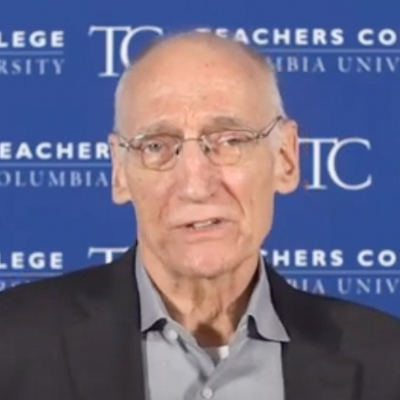
He taught us that when families and communities lack the resources to enrich children’s educational experiences outside the school, society has the responsibility to step in and provide those resources in order to support every child’s intellectual development.
Gordon’s focus on affirmative development “reflects his firm belief in the power of education to emancipate,” added TC Provost Stephanie J. Rowley. “Dr. Gordon has always used his training in human development and learning theory to focus on how to support the disadvantaged, how to include the needs of all learners, and how to use educational tools to expose and leverage potential.”
Conference co-organizer Madhabi Chatterji, Professor of Measurement, Evaluation & Education, quoted an assertion made by Gordon in 1966 that “in order to provide quality of education for disadvantaged children, we must identify the children and characterize the nature of the disadvantage, but psychoeducational testing and appraisal has more often been directed at establishing the fact and the quality of the deficit, rather than on evaluating the quality and nature of the learner and learning.”
Chatterji said that Gordon, who chaired an Educational Testing Service commission that, in 2013, called for sweeping changes in testing and assessment, has never ceased in spotlighting that disconnect.
“Our professor’s steady call has been for repurposing pedagogy and assessment toward affirmative development of every learner across the lifespan,” she said, “including the most disadvantaged among us in overcoming the barriers to success, barriers to their agency, embracing their differences, with real understandings of who they are, their nature, their qualities, characteristics, and needs. This is what this conference is going to be about.”
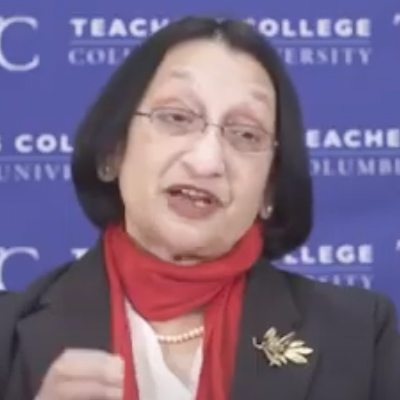
Our professor’s steady call has been for repurposing pedagogy and assessment toward affirmative development of every learner across the lifespan.
And in a pre-recorded video about Gordon's impact as a mentor, the conference's third co-organizer, Amy Stuart Wells, hailed Gordon for a lifetime dedicated to what the Gordon Centennial Conference itself was very clearly accomplishing.
“Dr. Gordon is such a connector,” said Wells, Professor of Sociology & Education. “I think our field has become very fragmented — everybody is off doing their own individual research and on one's really bringing it together to say, ‘What is the sum of these parts?’ But I feel like that's what Dr. Gordon has done and continues to do, even though he's turning 100.”
Over the course of two days, the conference celebrating Gordon featured four sequential themed sessions. The first of these, “Towards the Affirmative Development of Intellective Competence and Agency in Every Human Being,” touched on topics that ranged from fairness in artificial intelligence to pathways for success in STEM among students of color, to language as a metaphor for interpreting student learning across disciplines.
Among the first session’s highlights, two university presidents directly addressed efforts to encourage equity in educational opportunity. University of Washington President Ana Mari Cauce described games and learning programs parents can use to help children develop intellective competence. Such programs, she said, “allow low-income parents to, in Professor Gordon’s own words, ‘take control of their child’s education.’ They treat parents and caretakers as true partners with developmental researchers and service providers. And they provide a clear rationale for the approach, and an understanding of the science behind them.”
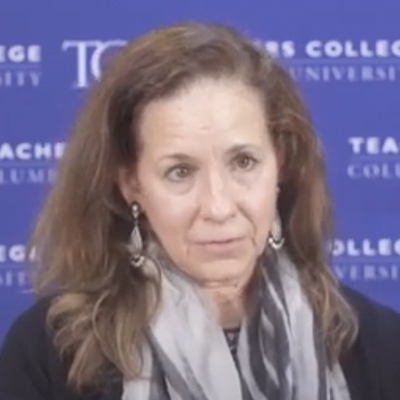
Everybody is off doing their own individual research and on one’s really bringing it together to say, ‘What is the sum of these parts?’ But I feel like that's what Dr. Gordon has done and continues to do, even though he's turning 100.
Freeman Hrabowski, President of the University of Maryland, Baltimore County — the nation's top producer of African American undergraduates who go on to complete an M.D./Ph.D. — discussed studies of success rates among students of color in STEM disciplines, particularly looking for predictors of enrollment in graduate study. The key to success “as Dr. Gordon has been saying all along,” Hrabowski said, has proved to be developing “empowering settings” by building community among students and helping them understand “they can control their destiny in that environment.”
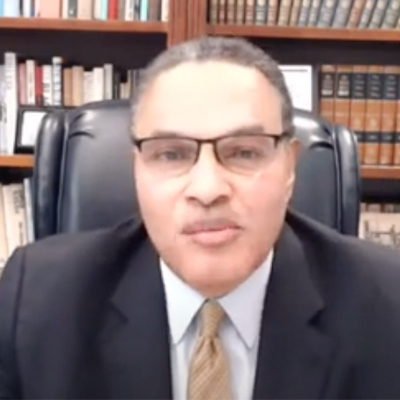
The key to success ‘as Dr. Gordon has been saying all along,’ has proved to be developing ‘empowering settings’ by building community among students and helping them understand ‘they can control their destiny in that environment.’
Ernest Washington, Professor Emeritus of Child, School and Family Studies at the University of Massachusetts at Amherst, urged a greater focus on studies of longitudinal data from early childhood that sought to index and correlate “fundamental units of enlightenment” that enable a child to begin to use language or to understand simple math. These units are “behaviors that we have to learn to the point of automaticity,” Washington said. Adding that spoken tongues are only one among many kinds of languages that include mathematics, science, sociology, and music, Washington said that he and his colleagues are looking for correlations among the variables representing the stages of cognition in each of these languages and any ability to predict learning outcomes.
But it may have been TC anthropologist Hervé Varenne, Professor of Education, who sounded the theme that is currently closest to Gordon’s heart: the need to give learners personal agency through access to resources and power.
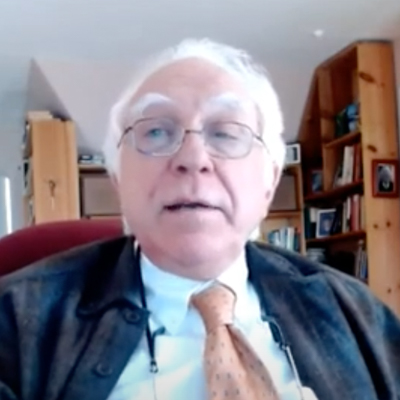
The parents of children at risk must be assumed to be doing all that they can given their resources. The question we must take to heart is how to get people the resources that they might need.
In interview excerpted at the beginning of the conference, Gordon noted that “wherever human societies have been organized by castes and classes, the highest caste or class has been the healthiest and best educated, and the lowest caste or class has been the least healthy and the least well educated,” and argues that “the more power, the more resources people have, the healthier they manage to be and the better educated they become.”
Varenne, who has speculated in the past that “perhaps by specifying curricula, pedagogies and the experts one must go through to be certified as knowing something, schools have been unwittingly limiting educational activities and the rewards they produce,” amplified that point.
“I insist with my students that agency is equally shared among all human beings,” he said. “I sometimes say that this is what moved homo sapiens from East Africa to the moon. The parents of children at risk must be assumed to be doing all that they can given their resources. The question we must take to heart is how to get people the resources that they might need.”
